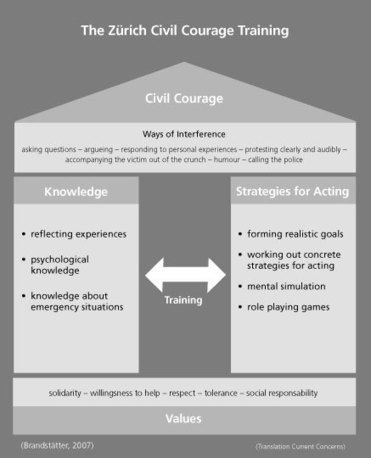
Désobéissance civile - Wikipédia
La désobéissance civile est le refus assumé et public de se soumettre à une loi, un règlement, une organisation ou un pouvoir jugé inique par ceux qui le contestent, tout en faisant de ce refus une arme de combat pacifique.
Le principe est utilisé aujourd'hui au sein des démocraties pour lutter contre certaines lois lorsque les militants estiment que la légalité, qui dépend de la majorité et / ou d'une certaine inertie, ne parviendra pas à modifier ces lois. La désobéissance est illégale par définition, mais est en principe non violente. Cependant, certaines actions en France ont revendiqué la dégradation de biens privés (par exemple les faucheurs volontaires). Certains ne voient dans ces actions que la dégradation de biens ou la résistance d'individus ou de groupes isolés, mais d'autres y voient un acte salutaire d'action directe de désobéissance civile visant à faire modifier la politique des autorités.
Learn more / En savoir plus / Mehr erfahren:
https://www.scoop.it/topic/21st-century-learning-and-teaching/?&tag=Civilit%C3%A9
https://www.scoop.it/topic/21st-century-learning-and-teaching/?&tag=civility
https://www.scoop.it/t/21st-century-learning-and-teaching/?&tag=Empathy
https://www.scoop.it/topic/21st-century-learning-and-teaching/?&tag=DQ
https://www.scoop.it/t/21st-century-learning-and-teaching/?tag=Empathy
https://www.scoop.it/t/21st-century-learning-and-teaching/?tag=Soft+Skills
https://www.scoop.it/t/21st-century-learning-and-teaching/?tag=Daniel-GOLEMAN
https://www.scoop.it/t/21st-century-learning-and-teaching/?tag=Emotional-Intelligence
https://www.scoop.it/t/21st-century-learning-and-teaching/?tag=EQ
https://www.scoop.it/t/21st-century-learning-and-teaching/?&tag=Frank+SONNENBERG



 Your new post is loading...
Your new post is loading...











Le principe est utilisé aujourd'hui au sein des démocraties pour lutter contre certaines lois lorsque les militants estiment que la légalité, qui dépend de la majorité et / ou d'une certaine inertie, ne parviendra pas à modifier ces lois. La désobéissance est illégale par définition, mais est en principe non violente. Cependant, certaines actions en France ont revendiqué la dégradation de biens privés (par exemple les faucheurs volontaires). Certains ne voient dans ces actions que la dégradation de biens ou la résistance d'individus ou de groupes isolés, mais d'autres y voient un acte salutaire d'action directe de désobéissance civile visant à faire modifier la politique des autorités.
Learn more / En savoir plus / Mehr erfahren:
https://www.scoop.it/topic/21st-century-learning-and-teaching/?&tag=Civilit%C3%A9
https://www.scoop.it/topic/21st-century-learning-and-teaching/?&tag=civility
https://www.scoop.it/t/21st-century-learning-and-teaching/?&tag=Empathy
https://www.scoop.it/topic/21st-century-learning-and-teaching/?&tag=DQ
https://www.scoop.it/t/21st-century-learning-and-teaching/?tag=Empathy
https://www.scoop.it/t/21st-century-learning-and-teaching/?tag=Soft+Skills
https://www.scoop.it/t/21st-century-learning-and-teaching/?tag=Daniel-GOLEMAN
https://www.scoop.it/t/21st-century-learning-and-teaching/?tag=Emotional-Intelligence
https://www.scoop.it/t/21st-century-learning-and-teaching/?tag=EQ
https://www.scoop.it/t/21st-century-learning-and-teaching/?&tag=Frank+SONNENBERG